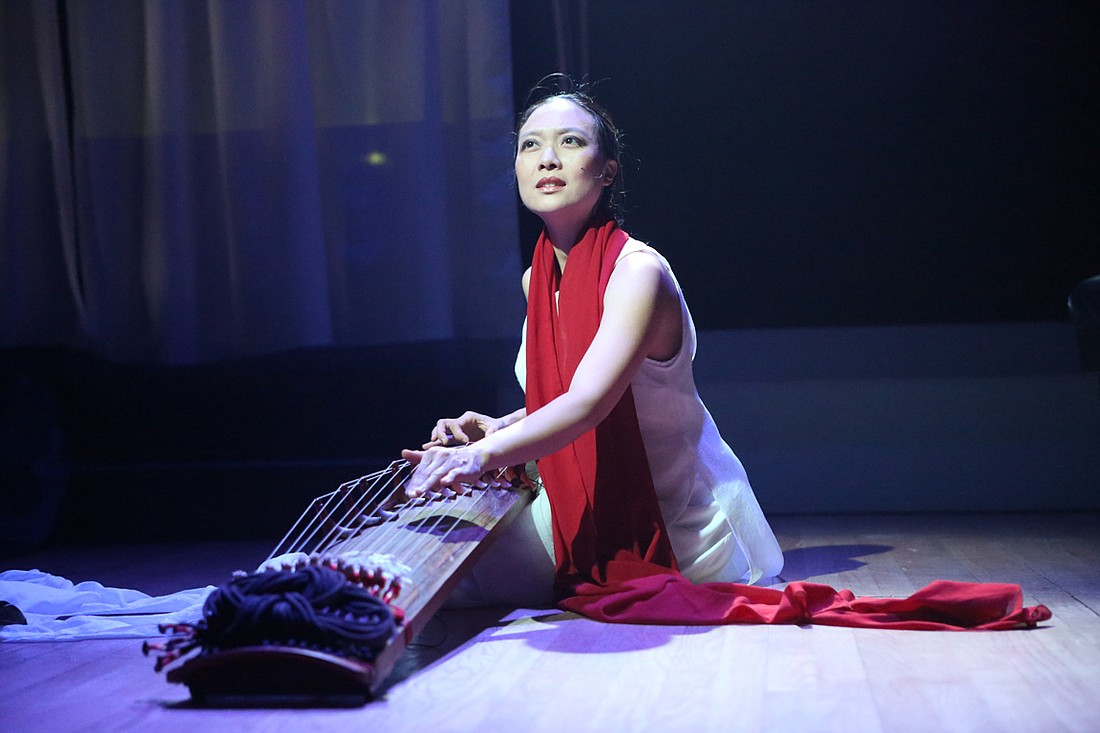- May 3, 2025
-
-
Loading

Loading

The Ringling International Arts Festival has taken on a more diminutive focus over the last couple of seasons, but smaller doesn’t necessarily mean lesser.
This year, RIAF turned its attention on Asia, in anticipation of the new Center for Asian Art at the Ringling Museum. The Festival is also centering even more on the unusual; what I’d call Off-Off-Off Broadway, if we were in New York City. You never know quite what you’re going to get, except that it will probably bring back the days of going to a poetry reading or lute recital in a smoky bar in the East Village. Without the smoke.
Much of this season’s RIAF dealt with movement: dance, performance art and circus, with a few musical events (and I use that word advisedly, because they’re more happenings than concerts) sprinkled into the eclectic mix. Of those, we took in Jen Shyu, “Solo Rites: Seven Breaths” and “Orkes Sinten Remen.”
Jen Shyu is a breathtakingly beautiful woman with a vocal technique that would make her the envy of Met Opera stars and a stage presence that is so charming, she makes you gasp with pleasure. Combining languages from Taiwan, Korea, East Timor and a couple of other far-eastern countries, she incorporates English translations into her renditions of folk tales and poems. On the surface, they appear to be of distant cultures, but because of her rare talents as a singer, actor and instrumentalist, she manages to draw us into those realms and feel we’re hearing a story from our own ancestors.
Singing with a range that takes her from the guttural chest tones of a man to the unearthly but beautiful head voice of an angel, she moves through melodies that call for quarter tones and scales foreign to Americans but, because of her communicative ability, make us feel perfectly at home. Moving from far eastern string instruments to a western Yamaha grand piano, she negotiates sounds and pitches as if she’s making them up as she’s weaving stories that leave us entranced.
“Our ancestors left us nothing but culture,” she sings and makes us realize how important ancestors and culture are to life. She has a simplicity on the surface that’s emboldened by a depth only the wise possess. Objects like a floating white cube (the earth) and gossamer robes and scarves (wind and water) are used to shatter our preconceived notions and show us we knew all along that the earth was merely paper waiting to be torn.
On the opposite end of the spectrum was the raucous beat of Orkes Sinten Remen. A wildly popular pop group in Indonesia, this ensemble, consisting of a vocal trio surrounded by a couple of Javanese ukuleles, violin, bass guitar, plucked cello and percussion, had difficulty transcending the language barrier, making it hard to understand what was going on. My initial smiles at the beat of the music and enthusiasm of the performers soon turned to frowns and peeks at my watch, thinking that a little of this goes a long way.
A good beat and graceful hand movements are nice for 10 or 15 minutes, but when those minutes turn into an hour and nothing of depth or interest has come out of it, I get bored. All the songs seemed to be played in the same key or a related key. They were mostly strophic – using the same music over and over for different stanzas, none of which we could understand, whether in English or an island language. I missed the necessary communication that goes beyond a throbbing dance beat and a simplistic chord structure.
Orkes Sinten Remen, with its leader, Djaduk Ferianto, dancers, singers and instrumentalists, had the audience at the Historic Asolo split between those who were tapping their feet and clapping their hands and those who sat in stupefied silence trying to figure out why we were there and what we didn’t get.
After much thought, I came to the conclusion I like variety, color and complexity in performances. Sinten Remen was intensely loud and offered a steady beat, but it lacked the power to move more than my feet.